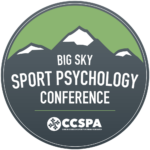At the turn of the twenty-first century, few universities offered sport psychology services from licensed mental health professionals. A leader in clinical/counseling sport psychology, Dr. Chris Carr, practiced in Indianapolis—the home of the NCAA. Dr. Carr collaborated with NCAA Sport Science staff on education and advocacy regarding sport psychology’s impact on the health and performance of collegiate student-athletes.
In 2005, a group of psychologists working in university athletic departments convened at the NCAA in Indianapolis to discuss issues in the field. Attending psychologists included Drs. Jim Bauman, Gary Bennett, Chris Carr, Jen Carter, Ron Chamberlain, Ken Chew, David Coppell, Bradley Hack, Doug Hankes, Nicki Moore, and Len Zaichowsky. After reviewing mental health disorders in student-athletes like depression, eating disorders, and substance use disorders, as well as ethical and administrative dilemmas, psychologists commented that the collaboration was informative and fulfilling. Addressing the unique needs of clinical/counseling sport psychologists in university settings satisfied professional development needs above and beyond existing organizations like APA Division 47 and AASP. In the words of Dr. Hankes, the collegiality “scratched an itch” like never before.
The group decided to continue meeting, and Dr. Carr suggested a ski retreat as the setting, inspired by the yearly Big Sky Athletic Training and Sports Medicine conference (BSATSMC). In 2006, the group of psychologists met in Park City, Utah, then selected the same February dates as BSATSMC to begin hosting the retreat in Big Sky, Montana. The first Big Sky Sport Psychology Retreat in 2007 included about twenty sport psychologists (licensed mental health providers that worked in athletic settings, which became criterion for attendance at future Big Sky meetings).
The Retreat occurs over three days with training and discussion in clinical practice, ethics, multiculturalism/diversity, performance psychology, and neuropsychology. Participants attend morning and evening sessions, and they engage in activities like skiing, horseback riding, and collegial discussion in between sessions.
A passionate subgroup of Big Sky sport psychologists wanted to create an organizational arm of Big Sky. Led by Dr. Josie Nicholson, Chairperson, they created the Collegiate Clinical/Counseling Sport Psychology Association (CCSPA) in 2014. CCSPA advocates for licensed mental health clinicians providing services to collegiate student-athletes by keeping interested agencies and administrators informed regarding best practices and standards of care. Founding members of the Big Sky Sport Psychology Retreat were named fellows of CCSPA.
Every year since 2005 has seen continued growth in numbers of licensed mental health providers with a defined role in athletics. The conference has grown to over 150 attendees that meet criteria for involvement due to their work at universities and in professional sports (e.g. NBA, MLB, NFL). In 2013, Chief Medical Officer of the NCAA, Dr. Brian Hainline, declared mental health as the number one sports medicine issue, defined by member institutions. With the growth in university sport psychologist positions stemming from increasing mental health needs, it has become even more important to have an organization that supports the development of this unique group of providers.
Thank you to Chris Carr and St. Vincent Sport Performance for their tireless work in creating a space in which clinicians with similar passions can connect, support each other, learn, and develop over so many years. It is the hope of CCSPA to continue helping clinicians connect, learn, and develop as the field of sport psychology continues to grow.

